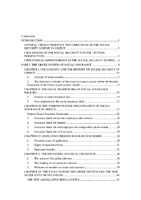The presence of funds of social insurance in the internet : evaluation and comparative analysis of websites

Master Thesis
Συγγραφέας
Μουχάκης, Δημήτριος
Ημερομηνία
2008-09-29Προβολή/
Θεματική επικεφαλίδα
Social security -- Finance ; Ασφάλιση, Κοινωνική ; Insurance -- FinanceΠερίληψη
Social protection in Greece is carried out via three systems: social security system, social welfare system and the national health system. The social security system is structured in three levels (pillars): the first level (pillar) includes the system of main and auxiliary compulsory insurance, the second includes occupational supplementary systems and the third includes private insurance cover (group premiums concluded between enterprises and private insurance companies and individual premiums). In particular, the Greek social security system is a system of public law, enshrined in the Greek Constitution (art. 22, par. 5), which operates with self-administrating social security organisations, set up by law for each occupational category of workers covering the totality of workers in the Greek territory. Social security organisations provide social security services, social work based on the solidarity between generations and do not have any lucrative purpose. The basic attributes of the national system of main and auxiliary pension schemes is the public, universal, compulsory and re-distributive character, while the economic system of its operation is pay-as-you-go. In Greece main insurance derives from the main insurance organisations which are public entities and governed by public law. Within the scope of their activity they exercise public power and their aim is to cover employees for insurance risks of ageing, disability, death, sickness and maternity, work accidents, occupational sickness etc in accordance with the International Labour Convention 103.


